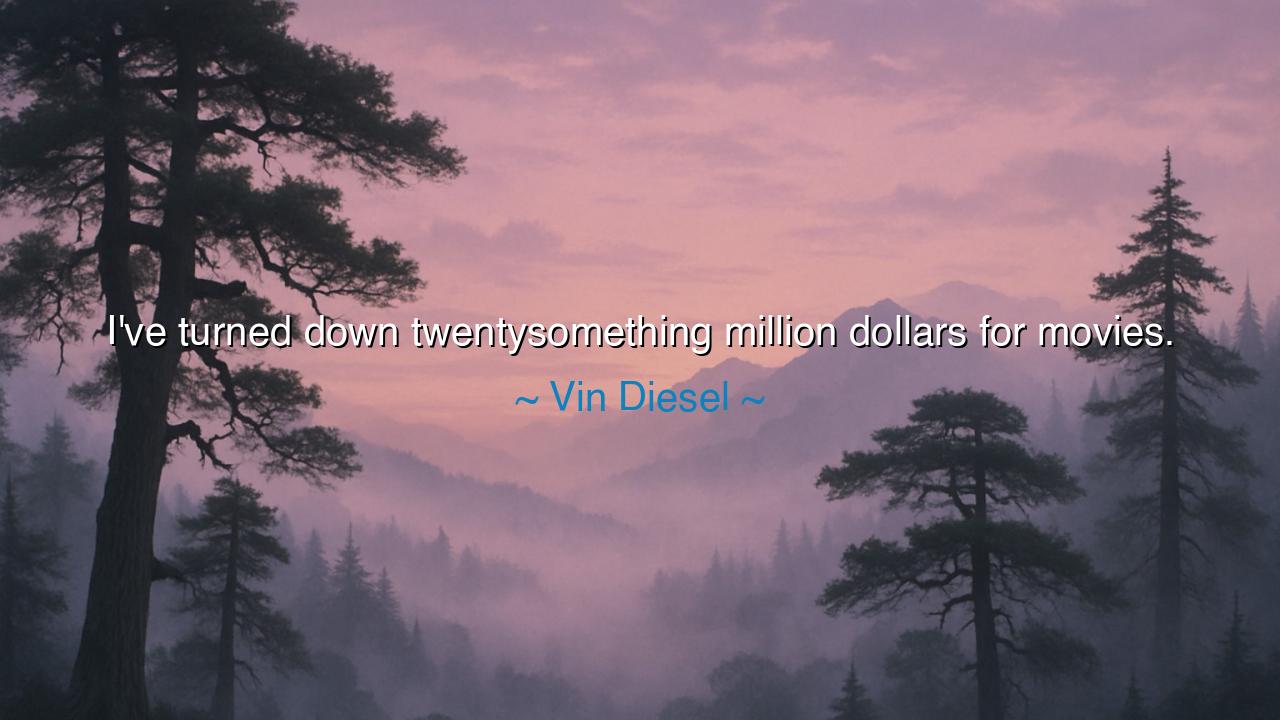
I've turned down twentysomething million dollars for movies.






Vin Diesel’s words, "I've turned down twentysomething million dollars for movies," reveal a profound wisdom about choice, values, and the pursuit of something greater than mere financial gain. In an industry where fame and wealth often drive decisions, Diesel’s admission speaks to a deeper truth: sometimes, the choices we make are not driven by material wealth, but by a desire to preserve authenticity, integrity, and personal fulfillment. By turning down such offers, Diesel demonstrates a commitment to principles that transcend the fleeting allure of money and glamour.
In the ancient world, the importance of wisdom over wealth was celebrated in the teachings of Socrates, who famously declared that "the unexamined life is not worth living." Socrates believed that a life driven solely by material pursuits was a life that lacked true meaning, a life devoid of introspection and purpose. The pursuit of money and status were not ends in themselves, but merely distractions from the true goal of life: the search for wisdom, virtue, and inner peace. Diesel’s decision to turn down such substantial sums of money is akin to Socrates’ disdain for materialism. It speaks to the wisdom of placing values above immediate gratification, recognizing that wealth and fame do not define the worth of a person.
Similarly, the Roman philosopher Seneca believed that true riches were not to be found in external wealth but in the peace and contentment that came from living a life guided by reason and self-control. In his letters to Lucilius, Seneca often warned against the pursuit of luxury and excess, suggesting that the wise man should instead seek happiness through simplicity and discipline. The temptation of wealth, Seneca argued, could easily lead one astray, causing them to neglect their inner development and moral integrity. Diesel’s refusal to accept millions for roles he deemed unworthy reflects this very wisdom—choosing to live a life that is not dictated by the allure of external wealth, but by the pursuit of something deeper.
In ancient Greece, Alexander the Great faced a similar tension between the worldly pursuit of power and the pursuit of a greater purpose. Despite his conquests, Alexander did not see his victories merely as a means to accumulate wealth and territory. Rather, he sought to bring the world together, to unite cultures, and to push the boundaries of human achievement. His desire for legacy and meaning drove him to great feats, even when wealth and power were already at his feet. Diesel, in his own way, exhibits a similar understanding—that it is not the riches or glory that define a life well-lived, but the purpose behind the choices we make. His refusal to chase after the shiny distractions of high-paying roles reveals a commitment to his own authentic path.
Diesel’s words also serve as a reminder of the ancient belief in the importance of self-mastery. The Buddha, in his teachings, emphasized the need to detach from worldly desires, not because material wealth is inherently evil, but because it often distracts us from true happiness and enlightenment. By turning down millions of dollars, Diesel is echoing this sentiment: that true fulfillment lies not in material accumulation, but in living in alignment with one’s values, whether those values are artistic or moral. His decision to reject the lure of fast rewards is an example of exercising self-mastery, choosing a deeper satisfaction over the superficial allure of wealth.
In the same vein, the ancient story of Diogenes, the ascetic philosopher, serves as a powerful example of rejecting materialism for a life of virtue and authenticity. Diogenes, living in a barrel in the marketplace, scoffed at the idea of wealth, power, and social status. He believed that a simple life, free of external desires, was the only path to true freedom and happiness. Diesel’s rejection of millions for roles that do not align with his values echoes Diogenes' disdain for wealth that does not serve the soul. By rejecting the temptation of lucrative offers, Diesel, like Diogenes, affirms that true wealth lies not in what we possess but in the quality of our choices and the authenticity of our actions.
The lesson from Diesel’s statement is profound: wealth and status are fleeting, and though they can offer comfort and power, they do not define the worth of a person. Just as Socrates, Seneca, and Diogenes taught that the pursuit of virtue and meaning should outweigh the pursuit of wealth, so too should we consider the choices we make in life. Diesel’s decision to prioritize personal integrity over the pursuit of money is a call to all of us: to examine our actions and our motivations and to choose what aligns with our deepest values.
In your own life, reflect on the choices you make, particularly when faced with opportunities that offer instant gratification but do not align with your deeper purpose. Like Diesel, recognize that money and success are not the final measures of a fulfilling life. True fulfillment comes from making decisions that are in alignment with your principles, that nourish your soul, and that leave a lasting legacy of authenticity and meaning. Be courageous in your choices, and remember that greatness lies not in what you gain, but in the integrity with which you navigate the journey.






AAdministratorAdministrator
Welcome, honored guests. Please leave a comment, we will respond soon